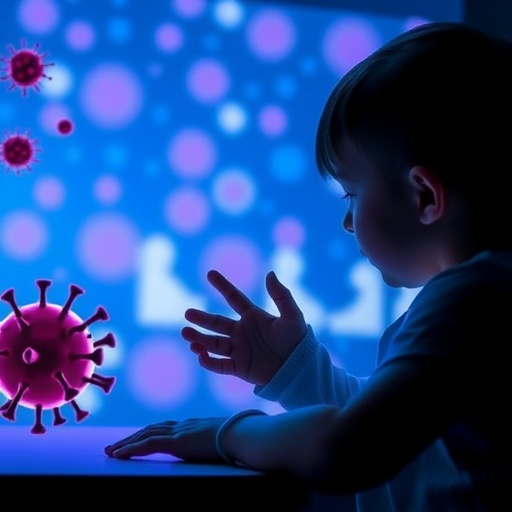A groundbreaking new study conducted by researchers affiliated with Mass General Brigham and their collaborators provides critical insights into the constellation of symptoms that define long COVID in young children, a demographic previously understudied in this realm. Long COVID, or post-acute sequelae of SARS-CoV-2 infection, is characterized by persistent symptoms that endure well beyond the acute phase of the viral infection. Although adult manifestations have been extensively documented, this latest research shifts focus to infants, toddlers, and preschool-aged children, unveiling symptom profiles that diverge meaningfully from those documented in older populations.
The comprehensive investigation, part of the federally funded RECOVER initiative spearheaded by the National Institutes of Health (NIH), presents nuanced distinctions in symptomatology across early childhood developmental stages. Infants and toddlers younger than two years were disproportionately afflicted with symptoms such as disrupted sleep patterns, increased fussiness, diminished appetite, nasal congestion, and persistent cough. Meanwhile, preschoolers aged three to five predominantly experienced dry cough alongside notable fatigability and reduced daytime energy. These findings illuminate developmental and physiological factors that may influence long COVID’s clinical expression in the youngest patients.
The study’s robustness stems from its large cohort, comprising nearly a thousand participants enrolled between March 2022 and July 2024 across more than 30 healthcare and community settings throughout the United States. Utilizing comprehensive caregiver-reported surveys, researchers meticulously cataloged a wide array of symptoms, assessing their persistence beyond the critical 90-day post-infection threshold. Notably, among children with a documented history of COVID-19, approximately 14% of infants and toddlers, and 15% of preschool-aged children met criteria consistent with long COVID, underscoring that even very young children are susceptible to protracted sequelae.
One of the study’s most compelling aspects is the methodical comparison between children with and without prior SARS-CoV-2 infection, which enabled the identification of symptoms more directly associated with post-COVID conditions. This distinction is paramount given that many reported symptoms—such as cough or tiredness—may overlap with other childhood illnesses. Researchers’ rigorous analytic frameworks help isolate symptom clusters attributable to COVID-19, providing a clearer clinical picture than previously possible.
Tanayott (Tony) Thaweethai, PhD, co-first author and associate director at Massachusetts General Hospital’s Biostatistics Research and Engagement unit, emphasized the study’s relevance for pediatric healthcare. He remarked that the long COVID symptom profile in young children diverges markedly from older children and adults, with affected children often experiencing compromised overall health and developmental delays. This observation speaks to the complex interplay between early childhood development and viral pathophysiology, suggesting that COVID-19’s impact during critical growth periods warrants specialized clinical attention.
Complementing Thaweethai’s insights, co-senior author Andrea Foulkes, ScD, director of Biostatistics at Mass General Hospital and professor at Harvard Medical School, highlighted the significance of establishing tailored diagnostic tools. The study’s novel symptom metrics provide a foundation not only for clinical assessment but also for future interventional trials designed to mitigate long COVID’s impact on this vulnerable population. By delineating age-specific symptomatology, the research equips clinicians and researchers with precision instruments to advance pediatric post-COVID care.
Nevertheless, the study authors appropriately caveat their findings, noting inherent limitations associated with survey-based data, including potential recall bias and challenges caregivers face in interpreting non-verbal symptom manifestations in very young children. Furthermore, reliance on antibody testing to confirm prior infection was sometimes limited, reflecting real-world constraints. Despite these challenges, the research represents a pioneering effort to systematically characterize post-acute COVID-19 effects in early childhood.
This investigation adds valuable granularity to the broader RECOVER initiative, which aims to unravel the multifaceted, age-dependent consequences of SARS-CoV-2 infection. Earlier phases of RECOVER focused on school-aged children and adolescents, mapping symptom trajectories and health outcomes. By extending focus to infants and preschoolers, the current study addresses a vital knowledge gap, underscoring the necessity of lifelong surveillance and care optimization for COVID-19 survivors beginning in infancy.
Importantly, the study’s findings bear significant implications for public health strategies and pediatric clinical guidelines. Recognition that even the youngest patients may harbor persistent, debilitating symptoms mandates vigilance among caregivers and healthcare providers alike. Early identification and supportive interventions might mitigate long-term developmental disruptions and improve quality of life, which the study associates with lower health-related well-being in afflicted children.
From a mechanistic perspective, the differences in symptom profiles across age groups hint at possible variations in immune system maturation, viral-host interactions, and neurodevelopmental vulnerability. For instance, sleep disturbances and irritability in infants could reflect neurological or inflammatory sequelae, while fatigue in preschoolers may correlate with systemic immune dysregulation. These hypotheses warrant further molecular and immunological studies to elucidate underlying pathways.
The authors also signal the urgency of integrating multidisciplinary approaches to tackle pediatric long COVID. Collaboration among pediatricians, developmental specialists, biostatisticians, and epidemiologists is essential to validate symptom clusters, refine diagnostic criteria, and tailor therapeutic modalities that accommodate developmental stages. Moreover, caregivers’ perspectives remain critical in shaping responsive healthcare delivery models given young children’s limited capacity to articulate symptoms.
In conclusion, this landmark research delineates a distinct clinical phenotype of long COVID in young children, characterized by age-specific symptom constellations and demonstrable impacts on health and development. It paves the way for targeted strategies in diagnosis, monitoring, and intervention, reflecting a paradigm shift in how the pediatric community responds to the enduring aftermath of the COVID-19 pandemic. As further investigations emerge, integrating these findings will be pivotal to safeguarding the well-being of children worldwide.
Subject of Research: People
Article Title: Researchers Identify Key Symptoms of Long COVID in Young Children
News Publication Date: 27-May-2025
Web References:
- Mass General Brigham Long COVID in Children and Adolescents Research: https://www.massgeneralbrigham.org/en/about/newsroom/articles/long-covid-children-adolescents
- New Framework for Defining Long COVID Highlights 12 Signature Symptoms: https://www.massgeneralbrigham.org/en/about/newsroom/press-releases/new-long-covid-framework-highlights-12-signature-symptoms
- Study Finds Persistent Infection Could Explain Long COVID in Some People: https://www.massgeneralbrigham.org/en/about/newsroom/press-releases/study-finds-persistent-infection-could-explain-long-covid-in-some-people
References:
Gross, R. S. et al. “Characterizing Long COVID Symptoms During Early Childhood,” JAMA Pediatrics, DOI: 10.1001/jamapediatrics.2025.1066
Keywords: Health and medicine




